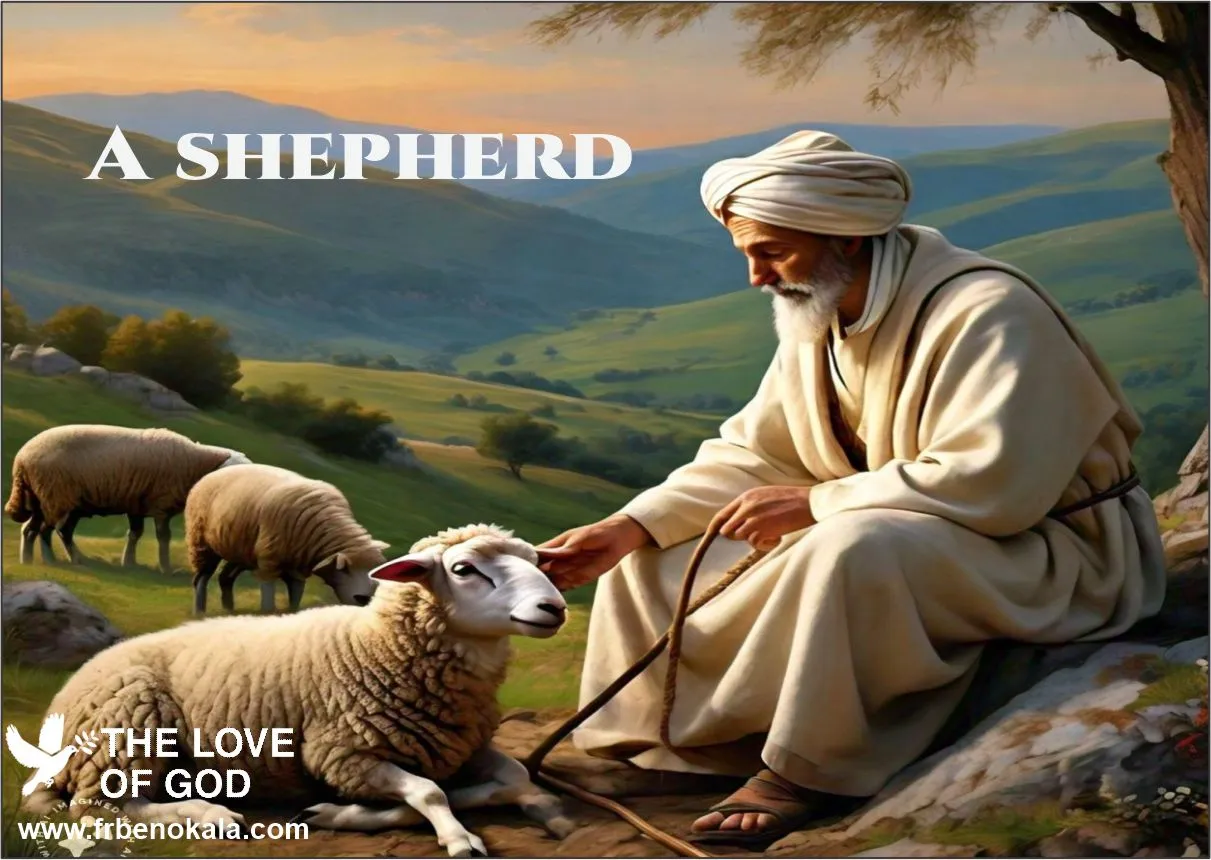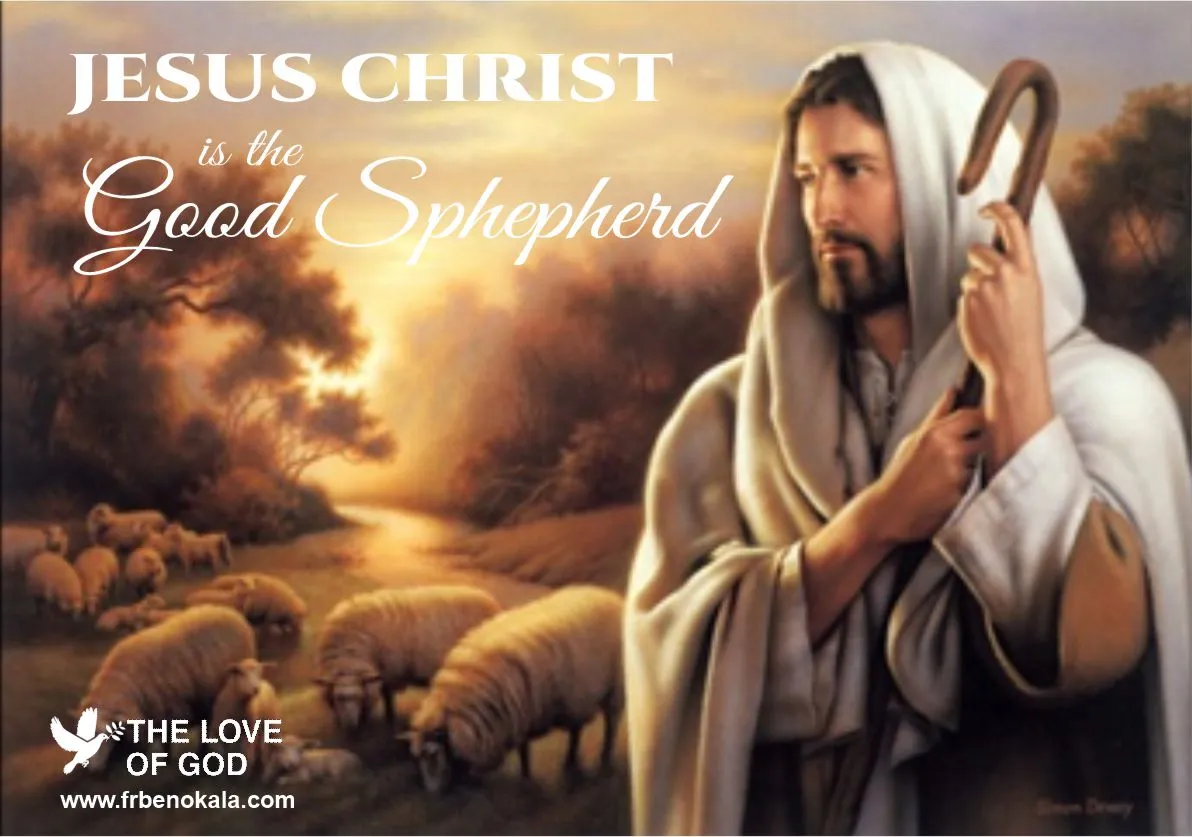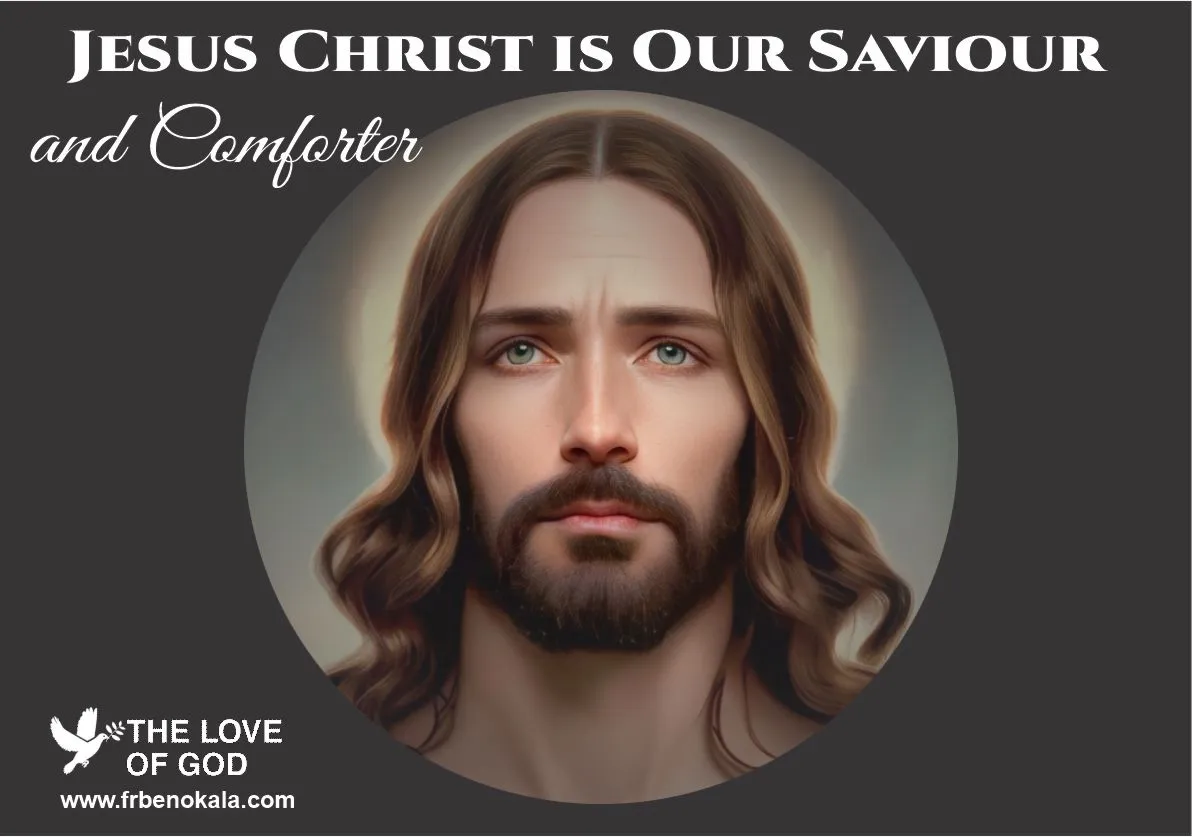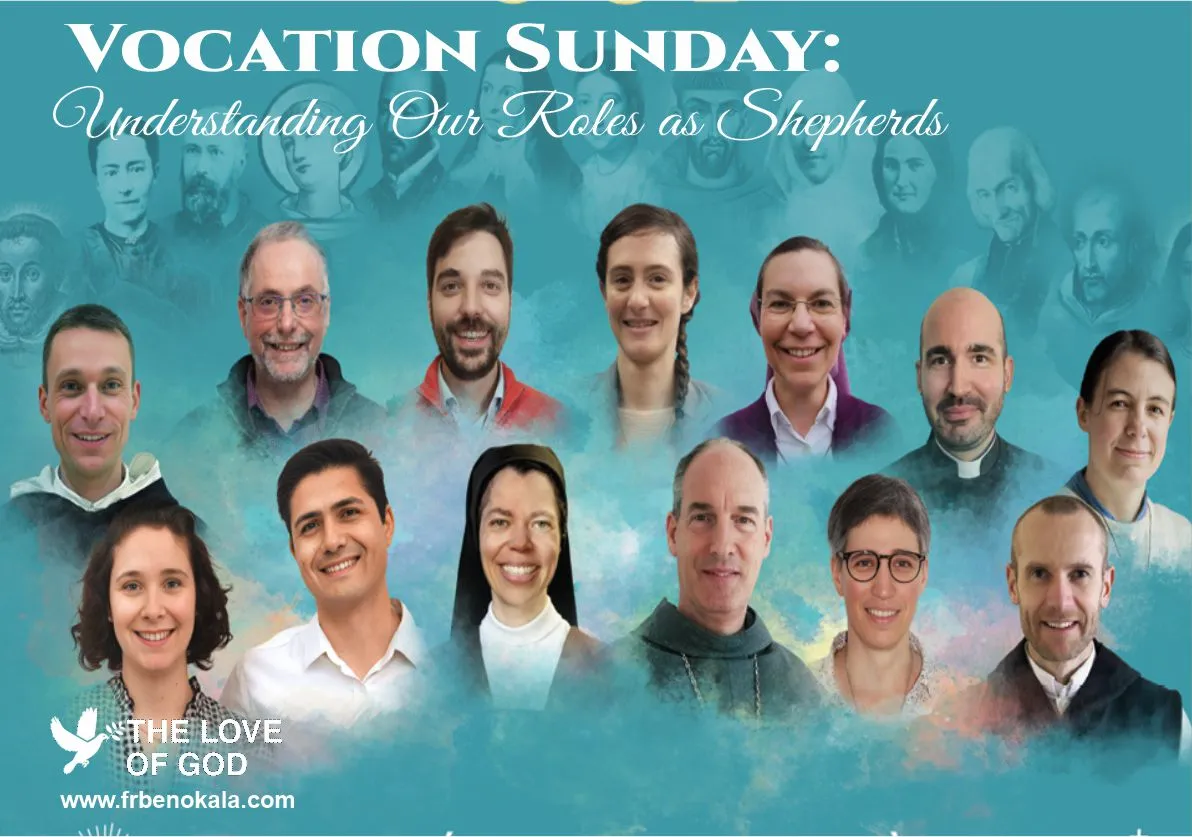Homily of the 4th Sunday of Easter, Year B
First Reading (Acts 4:8–12); Second Reading (1 John 3:1-2); Gospel (John 10:11–18)
Have you ever felt lost, unsure of your path, or in need of guidance? We all experience these moments in life, longing for a shepherd to lead us through uncertainty and challenges. The image of the Good Shepherd has been a source of solace and inspiration for centuries, offering a profound understanding of God’s love and care for His people. In this homily, we will explore the significance of the Good Shepherd and its relevance to our lives, particularly in the context of Vocation Sunday, as we discern and embrace our unique callings within the Christian community.
Who is a Shepherd?

A shepherd is someone entrusted with the responsibility of leading and tending to a flock, ensuring their well-being and safety. He is a caretaker, providing guidance, care, and protection, going beyond physical needs to nurture emotional and spiritual growth. This role demands selfless dedication and sacrificial love, qualities that resonate deeply with the Good Shepherd, Jesus Christ.
Jesus Christ is the Good Shepherd

The concept of the Good Shepherd is deeply rooted in the Christian tradition, symbolizing God’s loving and protective nature. Just as a shepherd watches over his flock, God watches over His people with unwavering care and compassion. In the gospel reading, Jesus declares, “I am the good shepherd. The good shepherd lays down His life for the sheep” (John 10:11). This statement exemplifies the sacrificial love and protection He offers those who trust in Him. His life, teachings, and actions embody the essence of shepherding, leading with unwavering love and guidance.
Jesus Christ is Our Saviour and Comforter

In the first reading, St. Peter, filled with the Holy Spirit, addresses the people about the healing of the disabled man. He declares that he was healed by the name of Jesus, whom they crucified but God raised from the dead. He emphasizes that salvation is found only in Jesus Christ and that there is no other name under heaven by which people can be saved (Acts 4:8–12). Besides, the name ‘Jesus Christ’ means Saviour (Matthew 1:21). He is the way, the truth, and the life and no one goes to the Father except through Him (John 14:6).
Regrettably, today, some people often trivialize and blaspheme Jesus’ name, even using His name to promote all kinds of jokes. Despite this abuse of Jesus’ name, God still forgives and intervenes when they face difficulties. Certainly, in times of uncertainty and distress, Jesus Christ, the Good Shepherd, is our source of comfort and guidance. He assures us of His presence and provision, giving us strength to navigate life’s challenges with courage and hope. God says, “If you pass through the waters, I will be with you, and you will not be drowned. When you walk through fire, you shall not be burned” (Isaiah 43:2).
Characteristics of a Good Shepherd

The image of a shepherd caring for his flock is a powerful metaphor used in many cultures and religions, including Christianity. The shepherd’s willingness to lay down his life for his sheep reflects the sacrificial love that Jesus demonstrated through His life, death, and resurrection.
Meanwhile, a good shepherd is someone who embodies the qualities of love, care, protection, and humility. Let us explore some of these specific characteristics that a good shepherd is supposed to possess:
Love:
- A good shepherd loves their sheep unconditionally, even when they stray or make mistakes.
- They are patient and understanding, and they always seek to restore the lost sheep to the fold.
- Their love is not based on the sheep’s performance or worthiness, but on their inherent value as creatures created by God.
Care:
- A good shepherd provides for the physical needs of their sheep, ensuring they have access to food, water, and shelter.
- They are also attentive to their emotional and spiritual needs, offering guidance and comfort when needed.
- They are willing to sacrifice their own comfort and safety for the well-being of their flock.
Protection:
- A good shepherd protects their sheep from predators and other dangers, both physical and spiritual.
- They are vigilant and watchful, always scanning the horizon for potential threats.
- They are also courageous and willing to fight for their sheep, even if it means putting themselves at risk.
Humility:
- A good shepherd leads his sheep with wisdom and compassion.
- A good shepherd does not seek power or recognition for themselves, but rather focuses on serving the needs of their sheep.
- They know the way and are able to guide their flock safely through difficult terrain.
- They are also willing to follow the guidance of others, especially when it comes to the spiritual needs of the flock.
Ultimately, being a good shepherd is about embodying the love, care, protection, and humility that Christ demonstrated for His followers.
Identifying a Bad Shepherd

Negligence, selfishness, and a lack of concern for the well-being of those entrusted to their care are the attitudes of bad shepherds. They prioritize their own interests, failing to provide the necessary care and protection for the sheep. Recognizing these traits is crucial for discerning genuine spiritual leadership and avoiding harmful influences.
In our contemporary society, some of our leaders operate on the altars of tribalism, oligarchic mentality, nepotism, and corruption. These negative actions reflect the characteristics of a bad shepherd. Their bad leadership skills engender a poor educational system, inadequate infrastructure, inflation, terrorism, kidnapping, and banditry. They further exacerbate the negative consequences for the economy and the well-being of the populace. These issues highlight the urgent need for ethical and responsible leadership to address the challenges facing the country.
Our Country Needs Good Shepherd Leadership
Our world desperately needs leaders who embody the qualities of the Good Shepherd. Leaders who are compassionate, ethical, and prioritize the well-being of all citizens, regardless of their background. Leaders who promote inclusivity, work towards national unity, and are open to dialogue and collaboration. Furthermore, a focus on sustainable development, investment in education, healthcare, infrastructure, and job creation, including a proactive approach to addressing insecurity, are crucial for steering the country towards progress and prosperity.
Similarly, effective leadership involves qualities like good communication skills, integrity, empathy, accountability, and the ability to inspire and motivate others. Transparency, honesty, and a commitment to eradicating corruption are essential qualities that can inspire trust and confidence in the leadership.
The Responsibilities of the Flock

Currently, there are individuals with idiosyncrasies who have a penchant for castigating and sabotaging the good works of leaders. These individuals often exhibit tribalistic mentalities, preferring a mediocre, clueless, and inexperienced person to rule them rather than a person of integrity, excellence, and good experience who has the panache to govern well.
However, the relationship between the shepherd and the flock is one of mutual trust and dependence. The flock must trust and obey, seeking nourishment and protection under the shepherd’s care. This responsibility fosters a harmonious and supportive relationship, contributing to the overall well-being and success of the community.
Vocation Sunday: Understanding Our Roles as Shepherds

Vocation Sunday is a day the Catholic Church prays for vocations, also known as Good Shepherd Sunday. It is a call from God. God calls some people to Priesthood, Religious Life, Marriage and also Single life. Vocation Sunday reminds us of our individual and collective callings within the Christian community. It invites us to reflect on the various ways we are called to serve and follow the Good Shepherd. Whether in the priesthood, religious life, or other spheres of life, our roles embody a profound spiritual significance.
Emulating the Good Shepherd in Our Vocations
The image of the Good Shepherd provides a profound framework for understanding our vocation. As followers of the Good Shepherd, we are called to emulate His qualities in our own lives. This involves demonstrating compassion, selflessness, and vigilance in our relationships and interactions with others. By embodying these qualities, we become vessels of His love and care in the world, reflecting His divine nature to those around us.
In the second reading, St. John reminds us of God’s incredible love for making us His children. For this reason, we ought to care selflessly for others as Jesus cares for us. This will prove that we are really and truly children of God, who “is love” (1 John 4:8, 16). As the scripture says, “For you were like sheep going astray, but now you have returned to the Shepherd and Overseer of your souls” (1 Peter 2:25).
Conclusion
Vocation Sunday serves as a poignant opportunity to reflect on our willingness to follow and trust in the guidance of the Good Shepherd. Jesus Christ, our Good Shepherd, leads us with compassion and selflessness, always watching over and caring for His flock. This assurance strengthens our faith and encourages us to follow His example of love and service towards others.
As we discern our individual callings, we need to prioritize the well-being of those entrusted to our care, just as the Good Shepherd prioritizes the safety and nourishment of His flock. Let us embrace the qualities of the Good Shepherd in our vocations, despite the complexities of our unique paths.
Call to Action:
- Reflect on your own vocation, whether as a priest, religious, married or single person.
- Reflect on your call to serve and follow the Good Shepherd.
- What qualities of the Good Shepherd can you embody in your daily interactions with others?
Prayer:
† Almighty God, our Shepherd, I commit those reading this homily to your care. Fill them with the power of your Holy Spirit. Grant them wisdom to discern their vocations and the courage to follow your lead. Inspire them to embody your love and care, serving their communities with dedication. Protect them from harm, grant them strength to overcome challenges, and peace of mind, through Jesus Christ, our Lord, Amen.†
Peace of Christ be with you…
Rev. Fr. Benjamin Okala, C.S.Sp.




